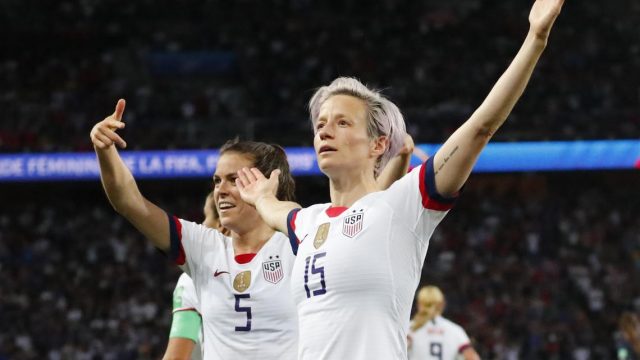If We Really Wanted Equality We’d Make the Female Soccer Players Compete With the Men

“The U.S. women’s soccer team has more than earned equal pay,” the Washington Post says in an editorial today.
I’ll admit to not knowing much about this team – I care very little for soccer, personally – but their argument is interesting.
Sportswear giant Nike reported the U.S. women’s team home jersey has become the No. 1 soccer jersey — male or female — ever sold on the company’s website in one season. According to the Wall Street Journal, the national women’s team’s games have generated more revenue than the men’s since their World Cup victory in 2015. This year, U.S. viewers watched the women’s team victory in record numbers. Despite this, FIFA will pay female World Cup teams a total of just $30 million, a meager award compared with the $440 million the 2022 men’s teams will take home in prizes.
The problems with this argument are numerous, but the biggest problem the Post and others taking this position have is that while equal work should certainly earn equal pay the product of women’s soccer generally is simply not as valuable as men’s soccer.
The Post points out that the American women’s soccer team has had more success, both commercially and on the field, than the men’s team. But soccer isn’t nearly as popular in the United States as it is elsewhere in the world, and FIFA is a global organization. They aren’t basing World Cup prize money on the trends of soccer’s popularity in the United States. They’re basing it on the global market.
And, globally, soccer played by males is far more valuable than soccer played by females. In 2018 the revenues for the male iteration of the World Cup was something north of $6 billion. The female iteration didn’t even crack $1 billion.
This is probably because men, in the aggregate, are better at playing soccer than women are. The World Cup sponsors different leagues for men and women because if they all had to compete against one another the men would dominate. The number of female players would non-existent, or next to it.
Not to put too fine a point on it, but in 2017 the U.S. National Women’s Soccer team was defeated by a bunch of 15 year old boys.
I point this out not to demean the women – though I’m not a soccer fan their success makes me proud, and I’m happy they’ve earned it – but to point out that even though they’ve had more success than their male counterparts of late on the whole, in the global marketplace, males play a better sort of soccer that earns more revenues.
What the Post and others are demanding is not equality. If we wanted equality, the men and women would all compete with one another for the same championships and remuneration. We don’t do that. We have a separate league for women which creates opportunities for many players who, if they had to compete against men, probably wouldn’t be playing professional soccer.
But this league earns less money, and thus the players are paid less.
To do otherwise would be unequal pay for unequal work.




